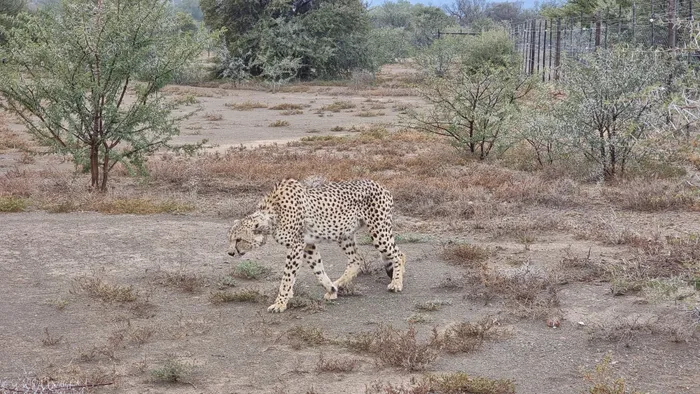Rietvlei Nature Reserve gets new cheetah

Thaba, the new cheetah at Rietvlei Nature Reserve.
RIETVLEI Nature Reserve in Pretoria has a new cheetah, Thaba, described as a magnificent large male with plenty of personality.
The six-year-old male originally hails from the Shambalala Reserve in Limpopo. Rietvlei’s only other cheetah is Njozi.
Vincent van der Merwe, of the Endangered Wildlife Trust, said Thaba was exceptionally relaxed around humans and very vocal.
Thaba was a free roamer male from the Waterberg region that naturally colonised Shambala, a metapopulation reserve close to Vaalwater.
“After escaping from Shambala on a few occasions, we moved him to Mount Camdebo national park in the Eastern Cape.
“He impregnated both females there and started to threaten another resident coalition. He repeatedly attacked them. We then made the call to move him to Rietvlei to prevent inbreeding and to avoid intraspecific mortality,” Van der Merwe said.
Thaba was settled at Rietvlei by the Endangered Wildlife Trust and the City of Tshwane, as part of the Cheetah Metapopulation Project.
The project is aimed at maintaining the genetic and demographic integrity of cheetahs on 61 selected fenced reserves in the country, and to increase the resident range of the free-roaming predators across southern Africa.
The Endangered Wildlife Trust project, supported by a host of partners and stakeholders, manages 421 cheetahs across the country.
As part of the Cheetah Metapopulation Project, the wildlife trust decided to keep a breeding female at Rietvlei Nature Reserve permanently, while rotating males when required.
This is to lessen the impact of the predators on prey in the reserve. Newborn cubs will be relocated to other nature reserves as they reach adulthood.
“Thaba is collared and will be monitored closely by the reserve’s conservation officials, and we hope to welcome new cheetah cubs to the Cheetah Metapopulation Project soon,” Tshwane mayor Randall Williams said.
Van der Merwe said Thaba born around April 2015. His parents are unknown free roamers of the Waterberg area.
He is habituated to vehicles within 10m and to people on foot to within 10m, and he is in excellent health.
It is hoped that he and Njozi, who have been roaming Rietvlei as a lone cheetah for the past few months, will soon produce cubs.
Njozi joined Rietvlei last year after she was relocated from a reserve in the Western Cape.
She was temporarily joined by a young male, Joe, who was earlier relocated. The two were, on occasions, spotted together by visitors to the reserve,
Van der Merwe said a reserve such as Rietvlei had enough prey for only one or two adult cheetahs at a time.
“You don’t want more cheetahs than that as you want to ensure that prey numbers don’t go beyond carrying capacity.
“We try to strike a balance. If there are too many cheetahs we will have to supplement prey,” he said.
Knowledge of cheetahs has grown fast and the wildlife trust has had success with its metapopulation project for the long-term viability of cheetahs in smaller fenced reserves, and with the long-term genetic and demographic integrity of the metapopulation across Africa.